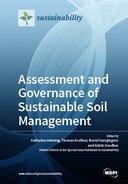Explore

Assessment and Governance of Sustainable Soil Management
0 Ungluers have
Faved this Work
Login to Fave
The role of soils for achieving the Sustainable Development Goals is multifarious. Soils are the essential basis for food and biomass provision in support of food security (SDG 2) and energy security (SDG 7). Soil carbon sequestration is paramount for climate action (SDG 13). Soil-mediated water purification and retention, nutrient and matter cycling, and soils habitat functions are essential for maintaining ecosystem services and biodiversity (SDG 15). Healthy soils perform well in all these functions simultaneously. However, the globally increasing demand for food, fiber, and bio-based products poses massive challenges to soil health. Minimizing trade-offs between biomass production and soil health requires systemic approaches to assessment and governance of sustainable soil management in agriculture and food systems. It provides interdisciplinary insights into key questions: What are the impacts of agricultural management practices on sustainability targets in specific geophysical and socio-economic contexts? What are the opportunities and risks of future trends such as climate change, digitalization, and emerging technologies for soil management and soil health? How can institutions and governance instruments be improved to enable decision makers to take action on sustainable soil management? The book was initiated in the frame of the National German research program ‘BonaRes—Soil as a sustainable resource for the bioeconomy’, and it is meant to trigger interdisciplinary thinking.
This book is included in DOAB.
Why read this book? Have your say.
You must be logged in to comment.
Rights Information
Are you the author or publisher of this work? If so, you can claim it as yours by registering as an Unglue.it rights holder.Downloads
This work has been downloaded 376 times via unglue.it ebook links.
- 288 - pdf (CC BY-NC-ND) at Unglue.it.
Keywords
- agricultural innovation
- agricultural policy
- agricultural practices
- agricultural yields
- alfalfa
- arid oasis
- bayesian network
- behavioural studies
- carob
- coffee by-products
- combination of modern and indigenous knowledge
- compaction
- conservation agriculture
- Contamination
- conventional farming
- Costa Rica
- creation ethics
- crop rotation modelling
- crop–livestock interactions
- désertification
- Driver-Pressure-State-Impact-Response sustainability framework
- Dynamic programming
- Earthworms
- Ecosystem services
- environmental zones
- Europe
- farmer motivations
- fertilization
- German Constitutional Law
- Germany
- governance
- gross income
- Institutions
- justifying soil protection
- Land
- Land management
- landowner
- Laudato si’
- legal comparison
- literature review
- Monitoring
- N leaching
- Nicaragua
- nutrient composition
- phosphorus
- Production
- Property rights
- rent price
- rent proportion
- resource scarcity
- resource use efficiency
- Risk assessment
- Sealing
- so-called organic fertilizer
- societal acceptance
- Soil
- soil compaction
- soil degradation
- soil food web
- soil framework directive
- soil functions
- soil governance
- soil health
- Soil management
- soil policy
- soil pressures
- soil protection
- soil remediation
- soil threats
- Soils
- spatially explicit
- subsoil
- subsoil loosening
- sustainability
- sustainability assessment
- Sustainable Agriculture
- sustainable soil management
- syria
- tenant
- thema EDItEUR::P Mathematics and Science::PS Biology, life sciences
- water infiltration
- yield
- yield potential
- zero tillage
Links
DOI: 10.3390/books978-3-03921-480-8Editions


